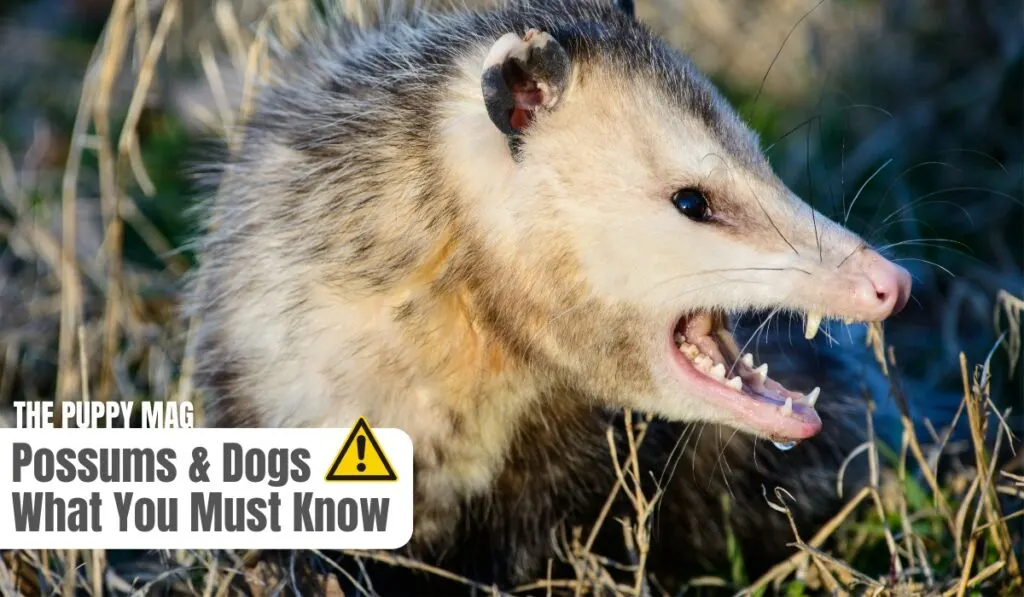As a dog owner, it’s essential to be aware of any potential threats to your furry friend, especially from local wildlife like possums.
We receive many questions from concerned owners like whether Possums are dangerous to dogs, and if they can transmit diseases…
This detailed guide is designed to answer all those questions, providing essential insights on the interaction between dogs and possums.
Let’s explore this topic and put your worries to rest.

Are Possums Dangerous To Dogs?
Generally, possums are not dangerous to dogs.
Possums are non-aggressive animals that prefer to avoid confrontation.
Their primary defenses are to “play dead,” bare their teeth, or emit a foul-smelling fluid to deter predators.
However, like any wild animal, they can become defensive if they feel threatened or cornered, potentially leading to a physical altercation with your dog.
Keep in mind, though, that the danger doesn’t always lie in an actual fight. Possums can carry various diseases that can be transmitted to dogs.
So while they might not pose a significant threat physically, there are other potential risks involved.
Can a possum harm my dog physically?
Possums, while generally non-aggressive, have sharp teeth and claws that can cause injury to dogs in a defensive situation.
While these cases are relatively rare, they can occur if the possum feels threatened and can’t escape.
These injuries can range from minor scratches to more serious wounds, depending on the severity of the encounter.
Can my dog catch diseases from a possum?
Yes, dogs can catch diseases from possums.
The most common diseases transmitted by possums to dogs are leptospirosis, tuberculosis, and coccidiosis.
Possum feces can contain parasites that cause these diseases.
Therefore, it’s crucial to keep your pets away from possums or any areas they frequent.
The Dangerous List:
What should I do if my dog gets into a fight with a possum?
First, try to safely separate the two animals without putting yourself at risk.
Don’t try to pull them apart directly as you could be bitten or scratched.
You can try to distract the possum or make a loud noise to scare it away.
After that, inspect your dog for injuries.
If you notice any bites or scratches, take your pet to the vet as soon as possible for a check-up and possible treatment.
Are possums usually aggressive towards dogs?
Possums are usually not aggressive towards dogs.
They are more likely to “play dead” or run away when they encounter a potential threat.
However, when cornered or protecting their young, possums can become defensive and may attempt to bite or scratch.
What are the signs that my dog has been bitten or scratched by a possum?
Signs that your dog might have been bitten or scratched by a possum include visible wounds, bleeding, or discomfort in a specific area.
Your dog might also show signs of pain or distress, such as limping, whimpering, or excessive licking of a specific area.
If you suspect your dog has been injured by a possum, contact your vet immediately.
How should I treat a bite or scratch on my dog from a possum?
If your dog is bitten or scratched by a possum, it’s critical to act quickly:
- First, restrain and calm your dog to prevent further injury.
- Carefully clean the wound with warm water and mild soap to remove any debris.
- Apply an over-the-counter antibiotic ointment, if available, and cover the wound with a clean cloth or bandage.
- Monitor your dog for signs of infection, such as redness, swelling, or pus discharge.
- Most importantly, contact your vet immediately.
The vet can provide a proper assessment and prescribe any necessary treatments.
Even with immediate first aid, it’s crucial to get professional veterinary care since possums can carry diseases that could potentially infect your dog.
How can I prevent encounters between my dog and possums?
To prevent encounters:
- Secure your trash cans: Possums are attracted to food, so make sure your garbage is not accessible to them.
- Clear your yard: Remove fallen fruit, uneaten pet food, or any potential possum attractants.
- Supervise your dog: Always supervise your pet when it’s outside, especially at night.
The best defense is prevention. If possums don’t find your yard appealing, they’re less likely to visit.
What should I do if my dog catches a possum?
If your dog catches a possum, it’s important to separate them without putting yourself at risk.
Once they are separated, confine your dog and call animal control to handle the possum.
Do not attempt to handle the possum yourself as they can transmit diseases.
Can my dog get rabies from a possum?
The chance of a dog contracting rabies from a possum is extremely low.
Possums are not typical carriers of rabies because their body temperature is too low for the rabies virus to thrive.
While any mammal can theoretically get rabies, the cases of possums with the disease are rare.
However, it’s always important to keep your dog’s rabies vaccination up to date to protect them against all potential sources of the disease.
The Dangerous List:
Summary
While possums can pose a potential threat to dogs, they are typically non-aggressive and would rather flee than fight.
However, they can become defensive if cornered or protecting their young, and they can transmit diseases.
The best way to protect your dog is through prevention – secure your garbage cans, clear your yard, and always supervise your pet outdoors.
If your dog has a run-in with a possum, check for injuries and consult your vet if needed.
Lastly, never attempt to handle a possum yourself. Call a professional to avoid unnecessary risks.
